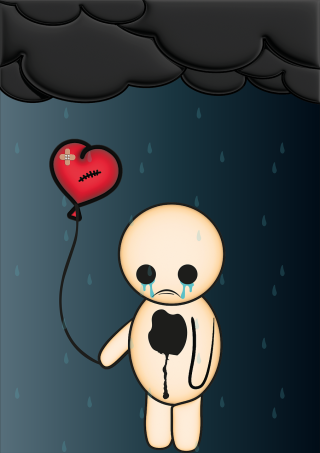Borderline Personality Disorder
Intimacy Difficulties in Adult Children of Borderline Sufferers
3 common struggles of being parented by someone with BPD.
Updated August 29, 2023 Reviewed by Abigail Fagan
Key points
- Adult children of parents with BPD often struggle with intimacy throughout their lives.
- Learning to trust others requires an understanding of the experience of parental betrayal and inconsistency.
- Healing and growth after an unstable childhood requires the willingness to find out how to trust safely.

Lifetime patterns of intimacy and attachment are strongly influenced by the relationship you have with your parents. Symptoms of Borderline Personality Disorder (BPD) cause sufferers to have unstable relationships. Unstable relationship patterns lack reliability and consistency which causes attachments to be insecure. Individuals raised by parents suffering from BPD tend to experience insecurity in their primary attachments. This often carries into adulthood and affects attachments to spouses, partners, children and friends in very specific ways. Three patterns will be described.
The most satisfying intimate relationships become secure as the result of two or more individuals behaving in a consistently benevolent way towards each other over time. High levels of consistency over greater periods of time produce the most secure and intimate relationships. Symptoms of BPD, such as emotional dysregulation and impulsivity, create instability in mood and in sense of self. This causes affected individuals to behave erratically. When they are pleased with a situation they can act affectionately and supportively towards others, but when things don’t go their way they may lash out aggressively, even towards loved ones.
The lashing out towards children can be direct, such as physical aggression and screaming at the child with hurtful statements. It can also take the form of emotional abuse, such as gaslighting, blame shifting, lying and betrayal. Over the course of their childhood, children of parents with symptoms of BPD often experience frequent shifts from affectionate/supportive to abusive exchanges with their parent. These shifts are often unprovoked and unpredictable. This lack of stability in the child’s primary attachment to the parent leaves them feeling insecure. They never know whether they will be welcomed or attacked. They can not depend on being well-received, though sometimes they are. They come to know that the parent who professes love to them is willing to be hurtful when displeased. These children naturally come to expect that all intimate relationships are unstable and intermittently hurtful and they approach their loved ones with these expectations into adulthood. This often produces the following struggles as they try to pursue intimacy as adults.
Difficulty Trusting
Many individuals who were raised by a parent with BPD symptoms experienced betrayal by the person most trusted during their time of profound innocence. Betrayal can take many different forms, as the parent generally puts their needs over the child’s. Following are a few examples that occur frequently to children of parents with symptoms of BPD.
- Lashing out at their child when the child does not agree with them.
- Humiliating the child by speaking negatively about the child in public. This is sometimes done by the parent in order to gain sympathy from others and embrace a victim identification.
- Revealing confidential information to others. Individuals with symptoms of BPD often struggle with boundary disorders, which makes it difficult to keep information confidential.
- Gaslighting and lying. Individuals with symptoms of BPD often find taking responsibility for errors or unwanted outcomes very painful. They often bend the truth or even fabricate events to suit their narrative, which always finds them innocent. Gaslighting involves lying to the child about something and then making them feel bad or crazy for questioning.
Reluctance to Share Thoughts and Feelings
Many children with parents who have symptoms of BPD find that exercising their natural tendency to share their inner thoughts and feelings with the affected parent often has a painful outcome. Sharing thoughts or opinions that the parent does not agree with or in any way can paint them in other than a positive light, is offensive to them and is likely to result in lashing out.
Even expressions or opinions that the parent does agree with can later be used in a hurtful manner. For example, PJ* asked his dad to go out for a steak dinner at his favorite restaurant for Father’s Day and his father agreed. They went to the restaurant and had a fine meal. When they went out to the parking lot, dad was upset to find that his car had been dented. Despite the fact that dad parked in a tight spot between two trucks, he blamed PJ for the damage. They had the following dialogue:
Dad: I can’t believe you take me to this place for Father’s Day and my car gets damaged.
PJ: I couldn’t have known that your car would get hit.
Dad: I wish we could have skipped the whole thing. Next year just get me a tie.
PJ: Dad, I told you not to park between two trucks, but you didn’t listen.
Dad: You did no such thing you ungrateful little brat.
PJ learned that if he expressed an opinion to his father, in this instance a favorite restaurant, he would be held responsible for any negative outcomes that could be attached to it at any time. It became clear to him that it is better to keep his thoughts and feelings to himself.
Difficulty Expressing Needs and Wants
How individuals with symptoms of BPD respond to the needs of others depends on their perception of how they will feel about addressing those needs. When they are asked to do something that they can easily do, such as being asked advice on a topic they are competent in, they respond favorably because it adds to their feeling of being valuable. Unfortunately, it is likely that their helping you will be raised later as a way of getting you to do something for them that you don’t want to do.
Asking a parent with symptoms of BPD to do something they are not comfortable with often makes them feel devalued, often resulting in them lashing out at you.
Children who were raised by parents with symptoms of BPD often habitually approach all intimate relationships with caution and introversion. This is how they coped with an emotionally abusive parent. For these children to have fully intimate adult relationships they must learn how to set boundaries that prevent others from hurting them. They must also learn to recognize traits in others, such as empathy, kindness, self-control, etc. that are most consistent with loving and respectful relationships so that they can choose healthy individuals to be intimate with safely.
*Example is a compilation of years of clinical experience.




